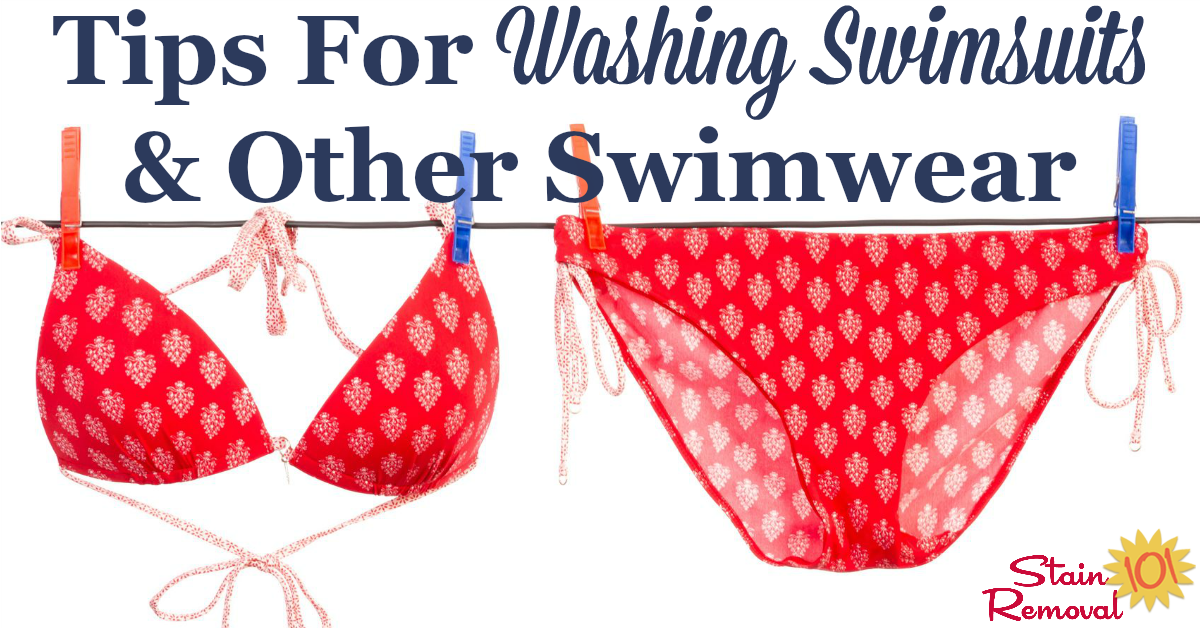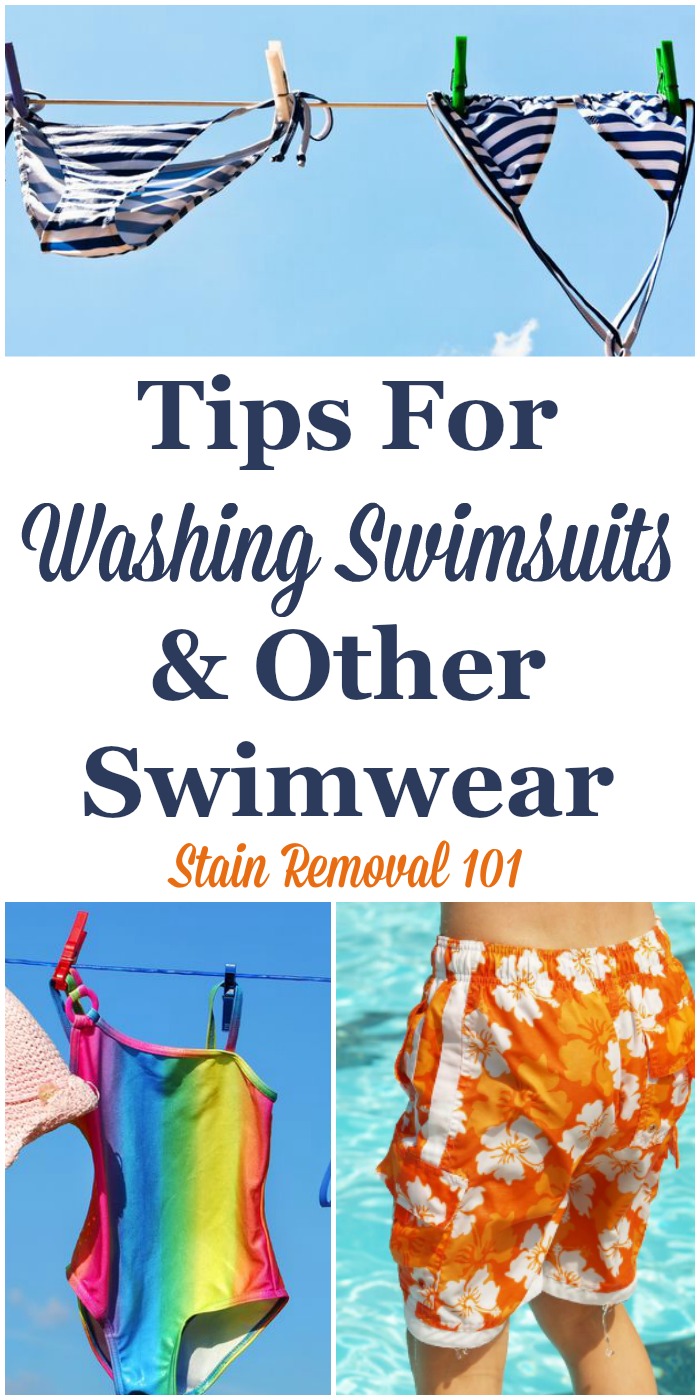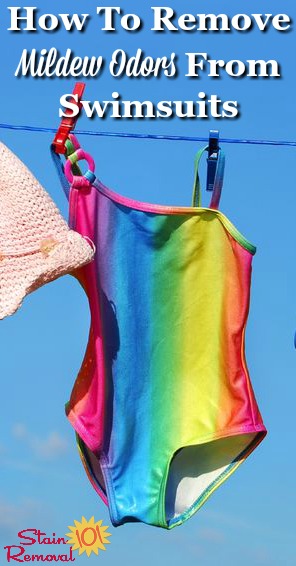Tips For Washing Swimsuits & Other Swimwear
Swimsuits cost a lot of money, and get a lot of use during the summer. Here are tips for washing swimsuits to keep them looking their best all season long. There's also tips for how to avoid smelly swimsuits and how to remove those orangish sunscreen stains that happen.

Summer's the time for swimming and having some fun outdoors, and a lot of those activities require you to wear a swimsuit. But if you're not careful, and don't wash your swimsuits properly, they are more likely to fall apart easily, fade, stretch, and can even begin to develop a smell that isn't so pleasant.
And all that is no good, because you want to look good in your bathing suit, plus you paid a lot for it and want it to last. Fortunately, when you wash your swimsuit properly it can stay looking like new, so below are the steps you should take to keep your bathing suit clean, the right way.
The Type Of Fabric In Your Suit Makes A Difference
Whenever you need to figure out the best way to wash something, you should check and see what the tag says the clothing is made from.
In the case of swimsuits they are made mostly from Lycra and spandex, at least for women's suits. Men's trunks also have some of these materials in them, but often much less, and that makes a difference in how you keep them clean.
The more spandex or Lycra present in the suit, the gentler you need to be with washing and drying it, so it doesn't fade, stretch out, lose elasticity, or the fabric does not otherwise degrade.
What To Do After You Wear Your Suit, Each Time
After each time you wear your swimsuit you should wash it, even if you only sunbathe and don't go in the water.
(You can get a printable cheatsheet here of how often to wash just about anything in your home.)
The reason you need to wash your swimsuit each time you wear it is both things in the water, such as chlorine, salt water, or even bacteria and algae in fresh water, as well as sweat, and sunscreen residue, can harm the delicate fabrics in your swimwear.
The quicker you remove those residues from the fabric the better your swimsuit will look, because these residues fade your swimwear, or even begin to break down the fibers or make it lose elasticity.
At Minimum Do A Quick Soak Of Your Swimsuit Even If Can't Wash It Immediately
I know, practically, it can be difficult to wash your swimsuit immediately after wearing, especially if you're on vacation.
Therefore, at the very least, when you get finished wearing it you should immediately rinse your suit off, such as in the shower, or better yet, let it soak in the sink or tub in cool water for about half an hour.
This rinse or quick soak removes a lot of the residues from your swimwear that causes the damage, and then you can wash the suit when you get home.
(Make sure you properly dry it though, after the quick rinse or soak, even if you haven't washed it yet, so it doesn't develop a mildew smell. You can see the directions below for more information about how to dry your suits.)
How To Wash Your Swimsuits
For the best results, that are least damaging to your swimsuit, you should always hand wash swimwear, using delicate wash detergent, such as Woolite or something similar, in cool water.
This may sound like more work than throwing it in the washing machine, but your suit will look much better, and last much longer, using the hand washing technique I'll discuss below.
If you must wash your suit in the washing machine be sure to wash it separately, use cool water, put the suit into a delicates wash bag (to prevent snags), use the delicate cycle, and still use delicate wash detergent.
Please note, as well, that boys' and mens' swim trunks can typically be washed in the washing machine, as described above, because they have less spandex or Lycra within them, and can therefore withstand the harsher washing technique.
How To Handwash Your Swimsuit
Washing your swimsuit by hand isn't hard at all, and really doesn't take much longer than all the steps above that I listed for washing it in the washing machine, but the results will make it worth your while.
Fill your sink, or a small washing tub, with cool water and then add a tablespoon of delicate wash detergent
You want to use a detergent that says it is safe for use on lingerie and bras, and does not contain enzymes. If you'd like more guidance on some good delicate wash detergents, including reviews, check out my delicate wash reviews page here on the site.

Swirl the water with your hand to mix the detergent into the water, and then submerge your suit. Let it soak for at least 15 minutes within the soapy water, and then gently squeeze and knead the suit to make sure the soapy water thoroughly cleans the suit.
Then, drain that soapy water and rinse your swimwear thoroughly to remove all soap residue. Again, only knead and gently squeeze the suit, never wring it, because wringing can stretch out the swimwear so it won't fit as well in the future.
How To Dry Your Swimsuits
After your suit has been washed you'll need to make sure it dries thoroughly.
Drying your suit is very important, because I think we've almost all experienced the "smelly suit" or swim towels that result when we throw a damp suit or towel into a closed bag and forget about it.
That smell is mildew, and it can linger within your suits if you're not careful.
(Need help with smelly swim towels, or other stinky towels? If so, I've got you covered. Check out my article about fixing smelly towels here.)

To avoid mildew growth is simple though, just make sure the suit dries before you put it away.
You never want to put your swimsuits in the dryer, because heat is very bad for spandex and Lycra, and can make them degrade and break down.
The heat also harms the elasticity and can make your suit lose its proper shape, looking saggy.
As mentioned above, you also don't want to wring the water out of your swimwear. So instead, the proper way to dry suits is to lay them flat on a towel to dry (flipping them over at some point to allow both sides to dry), or to dry them on a mesh drying rack.
Swimsuits are a thin material, so they'll dry pretty quickly. If there is a lot of water in the suit instead of wringing it out, you can press some of that water out by putting the swimwear between two towels.
Tips For Dealing With Common Problems In Cleaning Bathing Suits
The two most common problems when keeping your swimwear clean are mildew smells, and sunscreen stains. Here's what to do to fix both of them.
How To Remove Mildew Odors From Swimwear
The best tip I've got for mildew smells is to avoid them by properly drying your suits before storing them, but I know that doesn't always happen.
If your swimsuit has gotten a mildew smell you've got to balance the need to remove the smell versus potentially harming the fabric.
Use warm water (but not hot) and soak the suit for 15-30 minutes, in oxygen bleach, and then wash as instructed above.
If the smell is still there you can add a few tablespoons of vinegar to the soapy water to help cut the smell as well. Vinegar, because of its acidic nature, can be harmful to spandex and Lycra with prolonged exposure though, so rinse relatively quickly.
How To Remove Orangish Sunscreen Stains From Swimsuits
The other common problem when washing bathing suits is sunscreen stains.
That's because the chemicals within the sunscreen which help protect your skin also interact with chemicals in water and can sometimes cause orangish or brownish spots or stains.
To remove these spots create a paste of lemon juice and salt, and then apply to the stained areas and let sit for 15-30 minutes. Then, rinse and wash the bathing suit as instructed above.
You can learn more about why this works, and what is the cause of these orangish stains in my sunscreen stain removal guide.

Thanks For Visiting My Website: Grab Your Free Gift!

Hi, I'm Taylor, a busy mom with 3 kids, so I have lots of hands on experience with house cleaning, laundry and my fair share of spots, spills and other messy catastrophes. Thanks for visiting my site.
I update the website all the time with tips, tutorials, cleaning recipes, reviews of products from readers like you, and tests I've done on various cleaners, removers and laundry supplies.
I'd love to give you a gift! When you subscribe to my free weekly newsletter you will receive a free printable laundry stain removal chart that you can reference as needed.
I hope you enjoy this gift, and stop by again soon!
Related Pages You May Enjoy
Laundry Tips & Tricks For Everyone
Tips For Washing Bras: Best Practices & How To Do It In The Real World
Go From Tips For Washing Swimsuits & Other Swimwear To Home Page
CAUTION: This website is provided for informational purposes only. It is provided as is, without warranties or guarantees. Some stains and messes just won't come out, and are permanent. Further, some cleaning methods can harm your item, so if what you want to clean or launder is sentimental or expensive call a professional. See disclaimer of liability for more information.
Popular Laundry How To's
How Often To Wash Everything {With Printable}
Fix Bleeding Dyes Or Dye Transfer
Let's Stay Connected!
Get Free Email Updates
(and get a FREE printable)
Related Pages
 Detergent Reviews & Information
Detergent Reviews & Information
 Visit Household Management 101
Visit Household Management 101
 Visit Home Storage Solutions 101
Visit Home Storage Solutions 101








Share Your Comments, Tips & Ideas